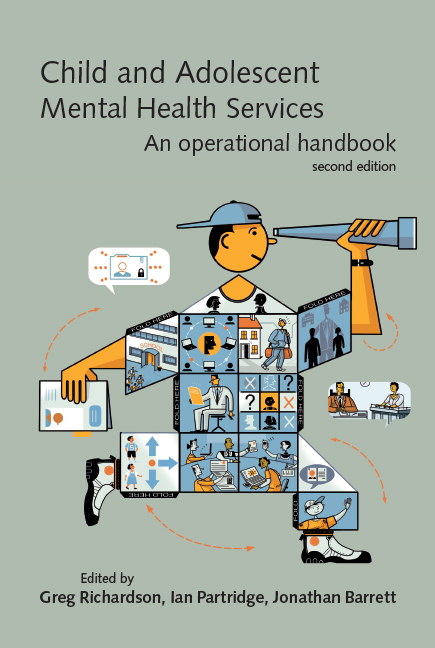Book contents
- Frontmatter
- Contents
- Tables, boxes and figures
- Contributors
- Abbreviations
- Preface
- 1 Introduction
- 2 CAMHS in context
- 3 CAMHS and the law
- 4 Structure, organisation and management of CAMHS
- 5 Evidence-based practice
- 6 Clinical governance
- 7 Education, supervision and workforce development
- 8 Multidisciplinary working
- 9 User and carer participation and advocacy
- 10 A comprehensive CAMHS
- 11 Referral management
- 12 Demand and capacity management
- 13 Strategies for working with Tier 1
- 14 Structuring and managing treatment options
- 15 CAMHS in the emergency department
- 16 Paediatric liaison
- 17 Self-harm
- 18 Learning disability services
- 19 Services for autism-spectrum disorders
- 20 Attentional problems services
- 21 Eating disorder teams
- 22 Bereavement services
- 23 CAMHS for refugees and recent immigrants
- 24 CAMHS and looked-after children
- 25 Drug and alcohol teams
- 26 Parenting risk assessment service
- 27 Court work
- 28 Tier 4 options
- 29 In-patient psychiatric care
- 30 Forensic services
- 31 Neuropsychiatry and neuropsychology services
- 32 Mental health provision for deaf children: study of a low-incidence service provision
- 33 Chief Executives – what do they want and how do they get it?
- Index
32 - Mental health provision for deaf children: study of a low-incidence service provision
- Frontmatter
- Contents
- Tables, boxes and figures
- Contributors
- Abbreviations
- Preface
- 1 Introduction
- 2 CAMHS in context
- 3 CAMHS and the law
- 4 Structure, organisation and management of CAMHS
- 5 Evidence-based practice
- 6 Clinical governance
- 7 Education, supervision and workforce development
- 8 Multidisciplinary working
- 9 User and carer participation and advocacy
- 10 A comprehensive CAMHS
- 11 Referral management
- 12 Demand and capacity management
- 13 Strategies for working with Tier 1
- 14 Structuring and managing treatment options
- 15 CAMHS in the emergency department
- 16 Paediatric liaison
- 17 Self-harm
- 18 Learning disability services
- 19 Services for autism-spectrum disorders
- 20 Attentional problems services
- 21 Eating disorder teams
- 22 Bereavement services
- 23 CAMHS for refugees and recent immigrants
- 24 CAMHS and looked-after children
- 25 Drug and alcohol teams
- 26 Parenting risk assessment service
- 27 Court work
- 28 Tier 4 options
- 29 In-patient psychiatric care
- 30 Forensic services
- 31 Neuropsychiatry and neuropsychology services
- 32 Mental health provision for deaf children: study of a low-incidence service provision
- 33 Chief Executives – what do they want and how do they get it?
- Index
Summary
‘What matters deafness of the ears when the mind hears? The one true deafness, the incurable deafness, is that of the mind.’
Victor HugoIntroduction
There are a handful of specialist national resources for children who have low-incidence conditions. These tend to be in London and offer out-patient and in-patient assessment and treatment. The service may be excellent but such centralisation raises issues of inequality of access for young people who live at a distance and find the travel problematic.
These services include gender dysphoria services, severe OCD, body dysmorphic disorders, autism assessment teams and neuropsychiatry. All of these are based at South London and Maudsley Hospital. There are also centrally funded adolescent secure forensic services around the country, as described in Chapter 30. These services are commissioned by the National Commissioning Group (NCG).
The role of the NCG is to commission services on a national basis for the population of England. In order to be eligible for funding by the NCG, the total number of patients in need of the service must be less than 400 per year nationally.
It is accepted that by concentrating the resources for these services on a national basis, it is possible to develop expertise in how best to commission them, to ensure safety and quality through a concentration of skills in a few centres, and to mitigate the risk to individual primary care trusts of unpredictable episodes of very expensive treatment.
The NCG was established in April 2007, following the recommendations of an independent review chaired by Sir David Carter (Department of Health, 2006). National commissioning is a responsibility of strategic health authorities and the NCG is hosted by NHS London on behalf of all 10 strategic health authorities. There are two elements to the NCG: an expert group whose role it is to advise Ministers on which services should be nationally commissioned; and the National Specialised Commissioning Team who support the NCG and implement its recommendations.
Specialist CAMHS for deaf children are also commissioned and funded centrally. This chapter aims to describe the development of CAMHS for deaf children as an example of how highly specialist CAMHS can be provided for low-incidence populations in an accessible way.
- Type
- Chapter
- Information
- Child and Adolescent Mental Health ServicesAn Operational Handbook, pp. 301 - 308Publisher: Royal College of PsychiatristsFirst published in: 2017



